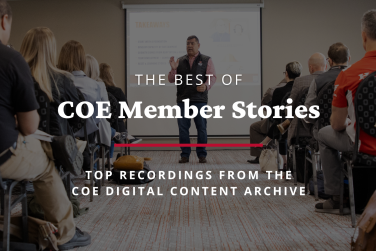
5 Curiosity Quick Tips (And Why It Matters) by Industrial Organizational Psychologist Bethany Klynn
I recently led a webinar for Fisher’s Center for Operational Excellence on the topic of “The Curious Leader,” which members can view in COE's Members Only Digital Content Archive (February 2020). We had a great discussion about how curiosity can help leaders build better relationships, grow their expertise, and become more innovative. I appreciated all of the questions that were submitted and wanted to answer a few more that we weren’t able to address in that hour.
How important is self-awareness to a mindset of curiosity? Are people who lack self-awareness limited in their ability to be curious?
Curiosity and self-awareness have a cyclical relationship with each other: the more curious you are, the more you can improve your self-awareness. And the more self-aware you are (especially of your areas of opportunity), the more often you are curious to learn more. I admire organizational psychologist Tasha Eurich’s research on self-awareness; she’s found that self-awareness is a skillset we can develop. And curiosity is an excellent tool to help us do so!
Curiosity can help us connect better with other people, read them more effectively, learn new information, and explore our blindspots. When we entertain the possibility that we might be wrong, we give ourselves the opportunity to learn. When we pause long enough to seek out information or ask for feedback, we can improve our self-awareness; we can better understand our strengths and weaknesses and the impact we have on others.
Are there things that leaders do inadvertently that tend to shut down curiosity in others?
Unfortunately, there are things we may do that can shut down curiosity. Francesca Gino (a Harvard professor and researcher) describes two such barriers. The first is one of mindset: when leaders think that encouraging employees to follow their curiosity will be too difficult to manage or will slow down decisions. The second potential barrier is when leaders strive for efficiency to the detriment of exploration.
While these obstacles can exist, the good news is that leaders can take action to encourage curiosity. They can be role models of intellectual humility: remaining open to the idea that they might be wrong and looking to learn from others. They can also encourage their teams to be curious and learn – even if it means making mistakes. When leaders punish people for their mistakes, they are less willing to take risks in the future. When leaders see mistakes as an opportunity to learn, they help their teams do the same.
As a leader, is showing curiosity at all damaging to our perception as being able to lead? If we don't appear to have a plan or direction, are people drawn to that leader? And how do you know when it’s time to stop being curious and start acting (i.e. avoiding analysis paralysis)?
There’s a lot of research that indicates that leaders who demonstrate curiosity are actually rated as more effective than leaders who aren’t considered curious. In fact, Adam Fetterman (at the University of Houston) has demonstrated that when we see someone admit that they are wrong, the wrongness-admitter is seen as more communal, more friendly, and rarely as less competent.
It is true that leaders need to be able to make decisions and lead their teams to take action and get results. The best leaders balance their curiosity with their ability to be decisive. They pause long enough to ask questions; they wonder “what am I missing here?” or “what do others know that could benefit me?” And then they use this information to make decisions and take definitive action.
What are some things I can start doing right away?
Here are my top 5 curiosity quick tips:
- Find a passion (or two): Identify what you’re passionate about, and it will be a constant source of enjoyable learning.
- Ask open questions, like “tell me about yourself.” Probing “why” is a good step: “why do you believe that?” “Why is that important to you?” A warm, earnest approach will make your partner comfortable so they open up to you.
- Walk it out: Walks help your brain feel great and get the creative juices flowing. According to research, walks help brain functioning, create a sense of well-being, & stimulate all your senses. I especially recommend walking a different route and get to know a new part of city.
- Get uncomfortable: Do something you’ve been meaning to try or that scares you. When you push yourself to do things you’re afraid of, it will expand your sense of what you’re capable of.
- Embrace the opposite: Try to understand an issue from both sides to become a strong critical thinker. It’ll help see the world with more empathy; it’ll also help you make a better case for your beliefs, because you understand the various arguments and counter-arguments that much better.
Can you suggest some books on the topic? And whom do you follow/ learn from?
I so appreciate this question! I’m an avid reader and a big believer that reading is an efficient way to learn. If you’re looking for a great book on these topics, I recommend you check out Carol Dweck’s Mindset; Tasha Eurich’s Insight; McCall, Lombardo & Morrison’s Lessons of Experience, or Adam Grant’s Think Again. If articles are more your speed, consider subscribing to a university’s newsletter (Fisher has several excellent ones!) or follow some interesting researchers or thought leaders (try Daniel Pink’s Pinkcast.) If podcasts appeal to you, check out Adam Grants “Work Life” or NPR’s “Hidden Brain” for fascinating explanations of human behavior.
What if I still want to learn more about curiosity? Do you offer team workshops or coaching?
I invite you to connect with me on LinkedIn; I share helpful resources and articles that might pique your curiosity. And if you’re in a company where people issues are cropping up (perhaps relationships could be improved, communication between individuals seems tricky, you’re trying to figure out how to navigate during a time of change or ambiguity, etc.) and you need an innovative solution, I’d love to help you. Send me an email at bethany@leadwithinsight.com with the subject “Appointment” and we’ll set something up. I’m more than happy to discuss potential interventions I offer that can help you and your team







